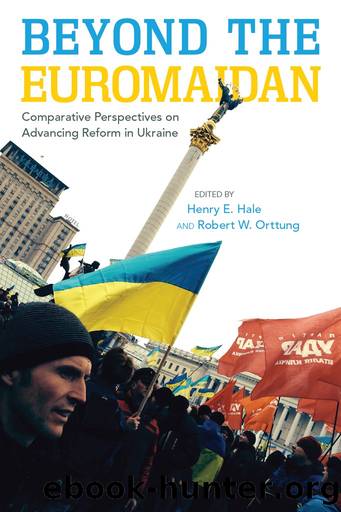Beyond the Euromaidan: Comparative Perspectives on Advancing Reform in Ukraine by Henry E. Hale & Robert W. Orttung

Author:Henry E. Hale & Robert W. Orttung [Hale, Henry E. & Orttung, Robert W.]
Language: eng
Format: epub
Tags: Political Science, General, Comparative Politics
ISBN: 9780804798457
Google: XjzRwAEACAAJ
Goodreads: 30072386
Publisher: Stanford University Press
Published: 2016-09-07T00:00:00+00:00
9
Judicial Reform in Comparative Perspective: Assessing the Prospects for Ukraine
DANIEL J. BEERS
Introduction
This chapter presents a comparative analysis of postcommunist judicial reform, identifying trends and policy lessons from more than two decades of developments in eastern Europe and the former Soviet Union. The analysis takes a wide-ranging cross-national perspective. Its primary objective is not to scrutinize the reform process in Ukraine but to contextualize it within the broader experience of Ukraineâs postcommunist neighborsâwith the ultimate goal of identifying possible avenues for the future.
One of the clearest lessons to emerge from this study is that judicial reform is a process fraught with challenges, particularly in the complex transitioning societies of eastern Europe. Even in the best cases, courts are subject to politicization and manipulation by elites, claims of judicial corruption and inefficiency are endemic, and skeptical citizens hold judicial institutions in remarkably low esteem. As one study observes; âIt is probably fair to say that less overall progress has been made in judicial reform and strengthening than in almost any other area of policy or institutional reform in transition countries since 1990â (Anderson, Bernstein, and Gray 2005).
Many explanations have been posited for the halting development of the rule of law in postcommunist states. In this chapter, I focus on a few key obstacles that have shaped the reform process in judiciaries across the region. These include under-resourced courts, entrenched corruption and public mistrust, an overemphasis on formal institutional solutions, and elite politicization of the judiciary. Considering each of these obstacles, I argue that Ukraine presents an especially challenging environment for democratic judicial reform.
Nevertheless, comparative analysis can offer some positive lessons about potential pathways to reform in Ukraine. Specifically, I examine the role of the European Union (EU) as a catalyst for change, as well as the impact of international law on domestic court systems in the region. I also explore how forces within the judiciary, including lower court judges and independent professional associations, can aid the reform process even in highly corrupt and politicized environments.
Ultimately, I argue that these pathways constitute viable options for reformers in Ukraine. However, their impact is likely to be limited in the absence of genuine and sustained elite commitment to the cause of democratic judicial reform. With the recent political opening following the 2013â14 Euromaidan protests, Ukraine may well be entering a new phase of democratic transition. In order to capitalize on this unparalleled opportunity, Ukraineâs new leaders will need to demonstrate a renewed commitment to partnership with the EU, as well as genuine respect for the rule of law and the independence of the judiciary.
Obstacles to Reform
In the following pages, I outline some of the primary roadblocks to postcommunist judicial reform, including resource scarcity, entrenched corruption, weak institutionalization, and politicization of the judiciary. Viewed from a comparative perspective, Ukraine faces challenges common to many states in the region. However, the scale and severity of the obstacles to reform are especially acute in Ukraine.
Resource Scarcity
For legal professionals in many postcommunist states, practical problems such as long case
Download
This site does not store any files on its server. We only index and link to content provided by other sites. Please contact the content providers to delete copyright contents if any and email us, we'll remove relevant links or contents immediately.
| Comparative | Conflict of Laws |
| Customary | Gender & the Law |
| Judicial System | Jurisprudence |
| Natural Law | Non-US Legal Systems |
| Science & Technology |
American Kingpin by Nick Bilton(3886)
Future Crimes by Marc Goodman(3600)
The Meaning of the Library by unknow(2571)
Inside the Middle East by Avi Melamed(2356)
Why Nations Fail: The Origins of Power, Prosperity, and Poverty by Daron Acemoglu & James Robinson(2297)
On Tyranny by Timothy Snyder(2232)
Living Silence in Burma by Christina Fink(2071)
Putin's Labyrinth(2022)
The Mastermind by Evan Ratliff(1937)
The Smartest Kids in the World by Amanda Ripley(1856)
Think Like a Rocket Scientist by Ozan Varol(1820)
Law: A Very Short Introduction by Raymond Wacks(1748)
It's Our Turn to Eat by Michela Wrong(1731)
The Rule of Law by Bingham Tom(1698)
Philosophy of law a very short introduction by Raymond Wacks(1670)
Leadership by Doris Kearns Goodwin(1638)
A Dirty War by Anna Politkovskaya(1630)
Information and Communications Security by Jianying Zhou & Xiapu Luo & Qingni Shen & Zhen Xu(1621)
Civil Procedure (Aspen Casebooks) by Stephen C. Yeazell(1556)
